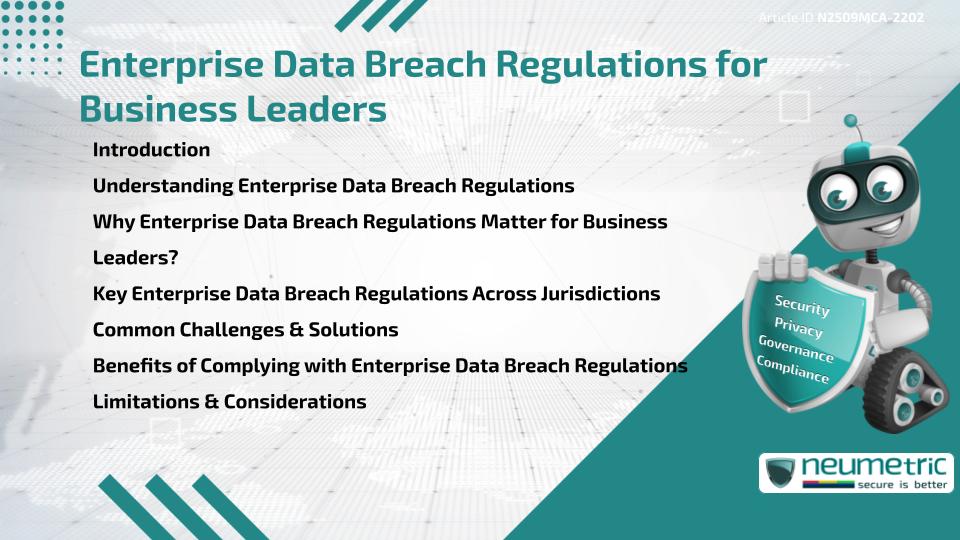Table of Contents
ToggleIntroduction
The rapid Rise of Cyberattacks has made Data Breaches one of the most serious Risks Enterprises face today. Enterprise Data Breach Regulations require organisations to notify Regulators, Customers & Other Stakeholders when Personal or Sensitive Data is compromised. For Business Leaders, understanding these Regulations is vital to ensuring Compliance, avoiding Penalties & Maintaining Trust.
Understanding Enterprise Data Breach Regulations
Enterprise Data Breach Regulations define Legal obligations for How organisations detect, report & respond to Data Breaches. These Regulations often specify Reporting timelines, required Disclosures & Accountability measures for Enterprises.
For example, the European Union’s General Data Protection Regulation [GDPR] requires Breach notification within Seventy-two (72) hours, while the United States enforces Sector-specific & State-level Breach Reporting Laws.
For details, see the European Data Protection Board.
Why Enterprise Data Breach Regulations Matter for Business Leaders?
Compliance with Enterprise Data Breach Regulations is not just about avoiding Fines, it also protects Brand Reputation & Strengthens Stakeholder relationships. These Regulations matter because they:
- Mandate timely Breach notification to regulators & affected individuals.
- Reduce Legal & Financial exposure from Non-compliance.
- Improve organisational Accountability & Transparency.
- Enhance resilience through structured Breach Response processes.
The CISA Data Breach resources highlight the importance of disclosure for National CyberSecurity Resilience.
Key Enterprise Data Breach Regulations Across Jurisdictions
- GDPR [European Union] – Requires notification to Regulators within Seventy-two (72) hours & to individuals if Risks are High.
- CCPA [California Consumer Privacy Act] – Imposes disclosure obligations for Breaches affecting California Residents.
- HIPAA [United States Healthcare] – Requires reporting of Healthcare Data Breaches to Regulators & Affected Patients.
- DPDPA 2023 [India] – Introduces mandatory Breach Reporting requirements to the Data Protection Board.
- LGPD [Brazil] – Requires Breach Notifications & Risk Assessments for affected Individuals.
The ENISA incident reporting guidelines provide comparative insights on Global practices.
Common Challenges & Solutions
- Complex Regulations – Map obligations across jurisdictions where the Enterprise operates.
- Short Reporting Timelines – Develop Incident Response Plans with clear escalation Paths.
- Reputational Concerns – Prepare communication strategies for Customers & Partners.
- Third Party Risks – Ensure vendors comply with Breach Notification requirements.
The NCSC UK Incident Response guidance provides practical solutions for these challenges.
Benefits of Complying with Enterprise Data Breach Regulations
- Regulatory Assurance – Avoids costly Fines & Penalties.
- Stronger Security Culture – Encourages proactive Monitoring & Incident Management.
- Customer Trust – Demonstrates Transparency & Accountability.
- Operational Preparedness – Improves Enterprise resilience in crisis situations.
Limitations & Considerations
Enterprise Data Breach Regulations vary widely across Jurisdictions & Compliance requires Continuous Monitoring. Following the rules does not prevent Breaches but ensures Enterprises are prepared to manage them effectively & lawfully.
Takeaways
- Enterprise Data Breach Regulations mandate timely Breach reporting & Accountability.
- Key Frameworks include GDPR, CCPA, HIPAA, DPDPA 2023 & LGPD.
- Compliance reduces Legal Risks, enhances trust & strengthens Enterprise resilience.
FAQ
What are Enterprise Data Breach Regulations?
They are laws that define How organisations must respond to & Report Data Breaches.
Why are they important for Business Leaders?
They reduce legal Risk, protect reputation & ensure Regulatory Compliance.
What is the GDPR reporting timeline?
Seventy-two (72) hours from the time of Breach detection.
Do Regulations differ Globally?
Yes, requirements vary by Country & Industry Sector.
Does Compliance prevent Breaches?
No, but it ensures Legal & Structured response when they occur.
References
- European Data Protection Board
- CISA – Data Breach Resources
- ENISA – Incident Reporting Guidelines
- NCSC UK – Incident Response Guidance
- IT Governance – Data Breach Compliance
Need help for Security, Privacy, Governance & VAPT?
Neumetric provides organisations the necessary help to achieve their CyberSecurity, Compliance, Governance, Privacy, Certifications & Pentesting needs.
Organisations & Businesses, specifically those which provide SaaS & AI Solutions in the Fintech, BFSI & other regulated sectors, usually need a CyberSecurity Partner for meeting & maintaining the ongoing Security & Privacy needs & requirements of their Enterprise Clients & Privacy conscious Customers.
SOC 2, ISO 27001, ISO 42001, NIST, HIPAA, HECVAT, EU GDPR are some of the Frameworks that are served by Fusion – a SaaS, multimodular, multitenant, centralised, automated, CyberSecurity & Compliance Management system.
Neumetric also provides Expert Services for technical Security which covers VAPT for Web Applications, APIs, iOS & Android Mobile Apps, Security Testing for AWS & other Cloud Environments & Cloud Infrastructure & other similar scopes.
Reach out to us by Email or filling out the Contact Form…


